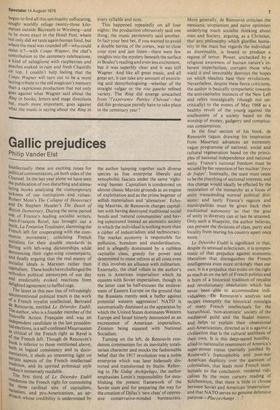Gallic prejudices
Philip Vander Elst Intellectually these are exciting times for Political commentators, on both sides of the Channel. In the last year alone we have seen the publication of two disturbing and stimulating books analysing the contemporary sickness of our institutions and values: Robert Moss's The Collapse of Democracy and Dr Stephen Haseler's The Death of British Democracy. During the same period one of France's leading socialist writers, Jean-Francois Revel, has brought out a book, La Tentation,Totalitaire, slamming the French left for cooperating with the comMunist movement; criticising French socialists for their double standards in flirting with left-wing dictatorships while denouncing their right-wing counterparts, and finally arguing that the real enemy of socialist ideals is Marxism rather than capitalism. These books have challenged the Orthodox political stereotypes of our day and predictably evoked reactions from delighted agreement to baffled rage. The latest in this new line of refreshingly unconventional political tracts is the work a 'French royalist intellectual, Bertrand Renouvin, entitled Le Desordre Etabli. The author, who is a founder member of the .Nlouvelle Action Francaise and was an independent candidate in the last presidential elections, is a self-confessed Maurrassian as critical of the French right as Revel is ?f* the French left. Though de Renouvin's ':)(ik is inferior to those mentioned above, boo in logical consistency and in docuMentation, it sheds an interesting light on certain aspects of the French intellectual tradition, and its spirited polemical style Makes it immensely readable. The first third of Le Desordre Etabli `tOndemns the French right for committing ne three cardinal sins of capitalism, racialism, and pro-Americanism, an apProach whose credibility is undermined by
the author lumping together such diverse species as free enterprise liberals and xenophobic fascists under the same 'rightwing' banner. Capitalism is condemned on almost classic Marxist grounds as an engine of exploitation and as the prime begetter of selfish materialism and 'alienation'. Echoing Maurras, de Renouvin charges capitalism with having destroyed traditional social bonds and 'natural communities' and having substituted instead an atomistic society in which the individual is nothing more than a cipher of industrialism and technocracy. The market economy is responsible for pollution, boredom and standardisation, and is allegedly dominated by a ruthless capitalist class, greedy for power and determined to resist reform at all costs even if this involves an alliance with militarism. Externally, the chief villain in the author's eyes is American imperialism which he equates with Soviet imperialism, though in the latter case he half-excuses the enslavement of Eastern Europe on the ground that the Russians merely seek a buffer against potential western aggression! NATO is automatically dismissed as the apparatus by which the United States dominates Western Europe and Israel bitterly denounced as an excrescence of American imperialism, Zionism being equated with National Socialism.
Turning on the left, de Renouvin condemns communism for its inevitably totalitarian character and mocks the fashionable belief that the 1917 revolution was a noble enterprise which was later hideously distorted and transformed by Stalin. Referring to The Gulag Archipelago, the author emphasises Lenin's responsibility for establishing the present framework of the Soviet state and for preparing the way for the creation of Djilas's 'new class' of oppressive conservative-minded bureaucrats.
More generally, de Renouvin criticises the messianic utopianism and naïve optimism underlying much socialist thinking about man and Society, arguing, as a Christian, that any philosophy which glorifies humanity in the mass but regards the individual as dispensable, is bound to produce a regime of terror. Power, unchecked by a religious awareness of human nature's inherent imperfection, corrupts those who wield it and inexorably destroys the hopes on which idealists base their revolutions. Nevertheless, despite these fierce criticisms, the author is basically sympathetic towards the anti-capitalist instincts of the New Left and refers nostalgically (though not uncritically) to the events of May 1968 as a healthy revolt of the young against the soullessness of a society based on the worship of money, gadgetry and conspicuous consumption.
In the final section of his book, de Renouvin (again drawing his inspiration from Maurras) advances an extremely vague programme of national, social and cultural regeneration based on the principles of national independence and national unity. France's national freedom must be secured by her retention of her nuclear 'force de frappe'. Internally, the state must 'cease to be the plaything of sectional interests, and this change would ideally be effected by the restoration of the monarchy as a focus of unity transcending normal political divisions; and lastly France's regions and municipalities must be given back their traditional autonomy so that the goal of unity in diversity can at last be attained. Only such a blueprint, the author believes, can prevent the divisions of class, party and locality from tearing his country apart once more.
Le Desordre Etabli is significant in that, despite its unusual eclecticism, it is symptomatic of that prejudice against economic liberalism that distinguishes the French intelligentsia even more strikingly than our own. It is a prejudice that exists on the right as much as on the left of French politics and is born of a historical tradition of royalist and revolutionary absolutism which has never been able to accommodate individualism. -De Renouvin's analysis and recipes exemplify the historical nostalgia of many French intellectuals for the hierarchical, 'non-atomistic society of the mediaeval guild and the feudal manor, and helps to explain their obsessional anti-Americanism, directed as it is against a civilisation that is the cultural antithesis of their own. It is this deep-seated hostility, allied to nationalist resentment of America's super-power status (partially justified by Roosevelt's francophobia and post-war American duplicity over the question of colonialism, that leads most French intellectuals to the conclusion, rendered ridiculous by the most cursory reading of Solzhenitsyn, that there is little to choose between Soviet and American 'imperialism' and that NATO serves no genuine defensive purpose—Plus ca change. . .!


























 Previous page
Previous page